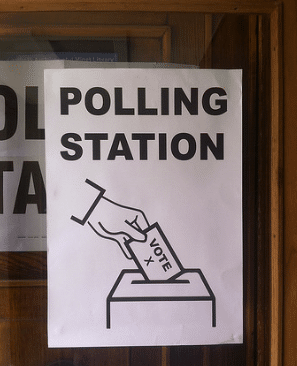Last Updated on June 25, 2021
 Teaching civic engagement increases students’ emotional intelligence and motivates them toward conscientious community action (Bernacki and Jaeger 2008). Research shows students who participate in civic engagement gain interpersonal effectiveness, the ability to collaborate across diverse perspectives, and a sense of self-efficacy for positively impacting individuals, organizations, and communities. How can teachers bring civic engagement to the classroom and build understanding of what it means to be an active participant in American democracy?
Teaching civic engagement increases students’ emotional intelligence and motivates them toward conscientious community action (Bernacki and Jaeger 2008). Research shows students who participate in civic engagement gain interpersonal effectiveness, the ability to collaborate across diverse perspectives, and a sense of self-efficacy for positively impacting individuals, organizations, and communities. How can teachers bring civic engagement to the classroom and build understanding of what it means to be an active participant in American democracy?
Educational podcasts can help to promote critical thinking and civic engagement in your classroom. Teaching with Listenwise can help students learn about civic participation, deepen their understanding of civic issues, and inspire civic action.
Teaching about civic participation
Compelling stories on democratic principles, processes, and structures core to U.S. citizenship can teach students about what civic engagement entails and how it plays out in everyday America.
Key to informed, responsible citizenship is understanding how our democracy functions. Engaging audio stories can help students learn about important civics topics such as the Separation of Powers, the role of the Electoral College, and Gerrymandering in Politics.
The upcoming election presents an excellent opportunity to help students fully understand the importance of exercising one of the most critical rights of citizenship–voting. Students can listen to podcasts to learn about the History of Voting Rights, as well as Why Many Americans Don’t Vote and how Campaigns to Fight Election Disinformation are needed in the face of evidence that foreign governments are trying to influence the election.
Deepening understanding of civic issues
Inviting students to think critically and empathically about a variety of contemporary issues and diverse perspectives featured in current events can help to prepare them for active citizenship.
Podcasts can be integrated into lessons that invite students to think critically about relevant contemporary issues such as whether whether the voting age should be lowered, whether students should have a legal right to literacy, or whether mosquitoes should be genetically modified to self-destruct. They can be motivated to think about their roles and responsibilities as citizens, including their role in being critical consumers of social media, and potentially be encouraged to effect positive change in the world by learning from examples, such as NFL players speaking out publicly about issues that matter to them.
Through discussion, debate, writing, and other learning activities in response to those stories, students can deepen their understanding of the issues while sharpening their critical thinking and literacy skills. Our Listenwise Friday debate series is especially well-suited for this purpose. Just search “debate” to find a list of these stories.
Inspiring civic action
Featured stories about individuals who have taken action to make a positive difference in their communities can provide models that spark students’ own ideas about what they can do to improve the world around them.
Lessons incorporating podcasts can engage students in considering issues that might affect them, such as bullying, and how they can take action to address those issues. They might act at the local level, for example, to protect the environment by creating urban habitats for monarch butterflies. They might learn about students engaging in national efforts, such as protesting gun violence, or global efforts, such as influencing the straw debate. Stories like The Hate U Give and the Call to Activism can provide fodder for discussion of complex social issues that touch the lives of many students. The immediacy and emotional texture of people’s voices can add resonance to their stories, so audio is especially well suited to generating responses that move listeners to action. Listenwise stories feature many examples of people making positive change.
The Listenwise platform incorporates a variety of digital tools to support comprehension, thus including learners at a range of literacy levels in thinking critically about rich, timely stories focused on issues that matter. In addition to using the listening comprehension and discussion questions accompanying each story, as well as the instructional activities and supports provided in lessons, you might be interested in the teaching resources included below. Please let us know if you find any of them useful and/or share others in comments.
Additional Resources Related to Promoting Civic Engagement
- NAEP Civics Framework
- Democracy and Civic Engagement from Facing History
- Voting and Voices Classroom Resources from Teaching Tolerance
- iCivics created by former Supreme Court Justice Sandra Day O’Connor
- Forgotten Purpose: Civics Education Today from NEA
- Ben’s Guide to the U.S. Government
- Critical Thinking and the Social Studies Teacher
